Last month we asked you which books are guaranteed to make you cry, and you came through with dozens of tearstained comments. In looking through our open thread of Books that Punched us in the Tear Ducts, it becomes clear that Cormac McCarthy and Robin Hobb have a lot to answer for, and that you will all be mourning Dobby for the foreseeable future. I’ve rounded up some of the top picks, and added a few of our own, so if you need a good literary cry we have you covered.
The Road by Cormac McCarthy
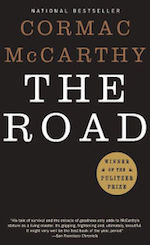 Let’s just get The Road out of the way first. Cormac McCarthy’s take on a dystopian thriller is about a father and son who try to make a life for themselves after an apocalypse. They trudge along a road that offers at least a tiny measure of structure, but no real safety, all the while fending off scavengers and remembering life before, when their family was whole. It’s all written in McCarthy’s signature terse, brutal style, and it is not an easy read, but it’s also brilliant.
Let’s just get The Road out of the way first. Cormac McCarthy’s take on a dystopian thriller is about a father and son who try to make a life for themselves after an apocalypse. They trudge along a road that offers at least a tiny measure of structure, but no real safety, all the while fending off scavengers and remembering life before, when their family was whole. It’s all written in McCarthy’s signature terse, brutal style, and it is not an easy read, but it’s also brilliant.
gnewell73 mentions that reading the book if you have small children might be tough going, while TLee appreciated the book’s “song to a father’s love” but also acknowledged that McCarthy’s novel hits “like a brick.”
The Shepherd’s Crown by Terry Pratchett
 Terry Pratchett’s The Shepherd’s Crown takes us back to Discworld one last time. Pratchett checked in with Granny Weatherwax and Tiffany Aching, and (figuratively speaking) puts the chairs on the tables and turns all the lights off.
Terry Pratchett’s The Shepherd’s Crown takes us back to Discworld one last time. Pratchett checked in with Granny Weatherwax and Tiffany Aching, and (figuratively speaking) puts the chairs on the tables and turns all the lights off.
feelingfuchsia86, Lara, phuzz, and SchuylerH all cited The Shepherd’s Crown as a tearjerker for the obvious reason that this is the last of the Discworld books, and we see the culmination of several character’s arcs over the course of the book. But more importantly, it was the last book that Sir Terry Pratchett wrote before his death, so reading the book becomes a strange exercise in not just saying goodbye to beloved characters, but to their author as well.
Deadhouse Gates: Malazan, Book of the Fallen #2, by Stephen Erikson
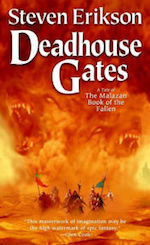 It’s certainly not a surprise that the dark brutality of the Malazan series would turn up in a list of books that make people cry. But we were interested in fact that the most cited story was the second book of the Malazan series, Deadhouse Gates.
It’s certainly not a surprise that the dark brutality of the Malazan series would turn up in a list of books that make people cry. But we were interested in fact that the most cited story was the second book of the Malazan series, Deadhouse Gates.
Ten years since Empress Laseen took the throne, a prophecy takes hold of people’s imaginations. In the Holy Desert Raraku, a seeress named Sha’ik prepares to lead her people in rebellion. She begins to raise the Whirlwind, he first step in leading the soldiers of Apocalypse into the war that will break Empress Laseen. But Laseen has her own army, a network of spies and assassins who will stop at nothing to solidify her power.
Fresh0130 summed it up nicely with the realization: “It was so much worse than I had imagined it would be.” And apparently commenter Mayhem had it even worse, adding: “the ending broke me completely, and in public no less.”
Among Others, by Jo Walton
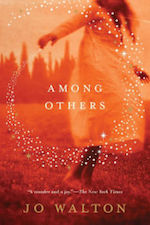 Among Others inspired a different type of crying in commenter Lara. Jo Walton’s Hugo-winning book is a delicate work, dancing right up to the edge of shattering magical battles while remaining grounded in the quotidian details of life. When we meet Mori she is bitter and shy, slowed by an injury that has left her in chronic pain, starting off at a boarding school she hates. Why is she so alone? She and her twin sister had to fight their mother, a mad witch, and the battle left Mori with a bad leg, and killed her sister. Now she has to play nice with her father and aunts (who don’t know the truth about Mori’s mother) while making a life for herself at boarding school, finding friends in the local town’s SFF club, and trying to rekindle her friendship with the fairyfolk, who have mostly abandoned her. The core of the book isn’t magic though: it’s an enduring love of books, and the way stories can create homes when we need them most. Lara highlighted this, saying that the book’s emotional punch came with the line “If you love books enough, books will love you back.”
Among Others inspired a different type of crying in commenter Lara. Jo Walton’s Hugo-winning book is a delicate work, dancing right up to the edge of shattering magical battles while remaining grounded in the quotidian details of life. When we meet Mori she is bitter and shy, slowed by an injury that has left her in chronic pain, starting off at a boarding school she hates. Why is she so alone? She and her twin sister had to fight their mother, a mad witch, and the battle left Mori with a bad leg, and killed her sister. Now she has to play nice with her father and aunts (who don’t know the truth about Mori’s mother) while making a life for herself at boarding school, finding friends in the local town’s SFF club, and trying to rekindle her friendship with the fairyfolk, who have mostly abandoned her. The core of the book isn’t magic though: it’s an enduring love of books, and the way stories can create homes when we need them most. Lara highlighted this, saying that the book’s emotional punch came with the line “If you love books enough, books will love you back.”
Assassin’s Apprentice by Robin Hobb
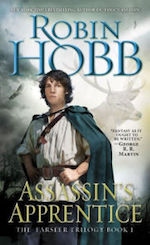 Assassin’s Apprentice follows Fitz, a prince’s bastard raised among the royal stables. His grandfather, King Shrewd, makes sure he receives the education to become an assassin, but not because of any sense of loyalty to the boy, only because he thinks he may one day prove useful. When raiders begin attacking the kingdom’s coasts, it seems that Fitz’ skills will be called into service—but the price for becoming an assassin may be even higher than he could have imagined.
Assassin’s Apprentice follows Fitz, a prince’s bastard raised among the royal stables. His grandfather, King Shrewd, makes sure he receives the education to become an assassin, but not because of any sense of loyalty to the boy, only because he thinks he may one day prove useful. When raiders begin attacking the kingdom’s coasts, it seems that Fitz’ skills will be called into service—but the price for becoming an assassin may be even higher than he could have imagined.
Commenter Michelle R. Wood discussed the book’s darkness, saying “I often recommend that series with the caveat ‘It will stomp on your heart’… It walks a very fine line, with plots that make defeat feel inevitable without slipping into nihilism. Instead, it teaches that sometimes life beats you up, but you still get up and keep going, sacrificing your all to do good even if no one else acknowledges.”
The Goblin Emperor, by Katherine Addison
 Along similar lines, Katherine Addison’s The Goblin Emperor wrestles with the life of a royal outcast. The half-Goblin Maia must ascend to an Elven throne, despite the fact that his subjects hate him and consider him a usurper. The book deals explicitly with the aftermath of trauma, and much of the plot circles the main character’s need to properly mourn his mother.
Along similar lines, Katherine Addison’s The Goblin Emperor wrestles with the life of a royal outcast. The half-Goblin Maia must ascend to an Elven throne, despite the fact that his subjects hate him and consider him a usurper. The book deals explicitly with the aftermath of trauma, and much of the plot circles the main character’s need to properly mourn his mother.
Celebrinnen mentioned the book saying, “I just reread The Goblin Emperor and though it had a few tear-yanking moments in the middle, as well, the ending is definitely one of these. It is steadily climbing towards a place among my favourite books.”
Never Let Me Go, by Kazuo Ishiguro
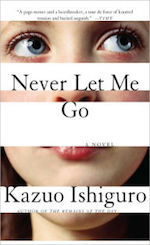 Kazuo Ishiguro’s novel meditates on the relentless march of time, while examining the many different meanings a word like “special” can hold. Kathy, Ruth, and Tommy are students at a boarding school called Hailsham, where they were buffeted by intense cliques and bound by strange rules. The book joins Kathy as a young woman just as Ruth and Tommy come back into her life. Together the three of them examine their shared past, and learn about how their school days, and “specialness”, will affect their futures.
Kazuo Ishiguro’s novel meditates on the relentless march of time, while examining the many different meanings a word like “special” can hold. Kathy, Ruth, and Tommy are students at a boarding school called Hailsham, where they were buffeted by intense cliques and bound by strange rules. The book joins Kathy as a young woman just as Ruth and Tommy come back into her life. Together the three of them examine their shared past, and learn about how their school days, and “specialness”, will affect their futures.
Molly Templeton cites this as her biggest tearjerker book, saying: “I cried my face off because (a) none of them would ever get to be who they were and (b) the end of the book is the loneliest thing I ever read.”
Ender’s Game, by Orson Scott Card
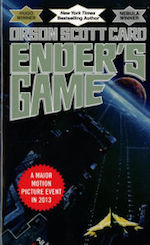 Emmet Asher-Perrin shared her own tale of woe: “When I read Ender’s Game as a kid, I had no idea what to expect—I just went in knowing that most of my friends adored it. My parents came home from grocery shopping to find me ugly-sobbing at the kitchen island. They wanted me to explain what was wrong, but I had no words; I just dropped the book onto the counter and pointed at it. It went on that way for a solid half hour, I just couldn’t stop. I’ve cried reading plenty of books before, but learning the truth about the aliens in Ender’s Game, that flat-out destroyed me.”
Emmet Asher-Perrin shared her own tale of woe: “When I read Ender’s Game as a kid, I had no idea what to expect—I just went in knowing that most of my friends adored it. My parents came home from grocery shopping to find me ugly-sobbing at the kitchen island. They wanted me to explain what was wrong, but I had no words; I just dropped the book onto the counter and pointed at it. It went on that way for a solid half hour, I just couldn’t stop. I’ve cried reading plenty of books before, but learning the truth about the aliens in Ender’s Game, that flat-out destroyed me.”
Charlotte’s Web, by E.B. White
 Commenter Josh may have had the most poignant answer of all: “First book, Charlotte’s Web.” I’m not sure if he means that E.B. White’s classic of pig mortality and rat literacy was the first book that made him cry, or the first book he ever read, but personally I’m guessing the latter, and I am right there with you, my friend.
Commenter Josh may have had the most poignant answer of all: “First book, Charlotte’s Web.” I’m not sure if he means that E.B. White’s classic of pig mortality and rat literacy was the first book that made him cry, or the first book he ever read, but personally I’m guessing the latter, and I am right there with you, my friend.
Between that and Black Beauty, I couldn’t look at an animal without crying sloppy empathetic tears for months (slightly problematic for a person growing up surrounded by farms, and the inevitable animal death that comes with farms) and yet I read them over and over again, coming to terms with Charlotte and Ginger, and learning that I could also cry in a happier way when I thought of the lives that Wilbur and Black Beauty had after so much tragedy.










@Emmet Asher-Perrin The same thing for me with Ender’s Game, except we were driving home from a vacation at the beach. My parents were really worried because I just started crying and I couldn’t explain why.
Read and watched The Road – I found the movie more emotional than the book – I find McCarthy is hard to read sometimes, they way he writes dialogue. The Road is just very bleak.
Haven’t read any others in this article However, after the original article was posted, people had posted about Flowers for Algernon – which I finally read. Again…I can understand how it would get the emotions worked up in people, but it did not do that for me. I enjoyed it though.
I still can say the only 2 books I read that were close to evoking tears (and they did not by the way) were Christopher Conlon’s Lullaby For The Rain Girl, and Robert McCammon’s Boys Life.
Charlotte’s Web was my first chapter book as well (that I read on my own)…although it didn’t make me cry.
I am not reading it to my 5 year old…I can’t remember why he asked about it. Maybe he was just asking about the name Wilbur and that made me bring it up. Actually, I kinda forgot how, well, blunt it is at times, heh. The realities of farm life, I suppose, which we are far removed from. I do wonder how he’ll react when Charlotte actually does die. We’ve only just now gotten to the part where Wilbur learns of the nefarious plot against him.
Another Robin Hobb series, Soldier’s Son will stomp on your heart too. It’s hard not to get terribly depressed along with the main character as woes befall him one after another like a cascade of bricks from an endlessly tall tower.
I was reading, “All the Weyrs of Pern” and had to put the book in my lap, take my glasses off and just sob for a while. I was 15ish. My father walked in and asked what was wrong, I just picked up the book and showed him the spine. He said, “Ahh,” then walked away. He was used to my mother crying at books quite often, and knew I was okay. Heh.
If you have Ender’s Game, you have to have Ender’s Shadow. The first few chapters are depressing to begin with, but that ending breaks and mends your heart all at the same time. Bean’s clinical and analytical point of view do nothing to soften the situations he goes through. It even explains some situations in Ender’s Game that didn’t make sense, making you even more sad for the situation Ender was forced to face. Even the adults are who are only seen as the villains that manipulate the children to do their bidding, you see them as flawed adults that are trying to save the world as best they can with as little casualties as possible. Ender’s Shadow is forever one of my favorite books.
I always found The Sparrow by Mary Doria Russell to be heartbreakingly sad and disappointing.
(then again, I still get all teary-eyed at the destruction of Solace in the original Dragonlance trilogy)
I cry at the end of many books, I realise. Here are three SFF ones I liked:
Orbital Resonance by John Barnes
Cards of Grief by Jane Yolen
Seven Lives and One Great Love, Memories of a Cat by Lena Divani
I should like to add most of Vernor Vinge’s “A Deepness in the Sky” and the end of Scott Lynch’s “Red Seas Under Red Skies”. Not to forget the tale of Turin from Tolkien.
Also, “A Storm of Swords” didn’t exactly make me cry, but if I had been a more athletic type you’d have seen me throw a large hardcover across the room :P
Yes to Enders Game being sad, but the one that made me cry first and last and always is the final scene in the Lord of the Rings (not the movie, thanks), when Sam says goodbye. I’m crying now.
The first book that made me cry was Felix Salton’s Bambi. This is not the later, Disney version, but the original book. It’s intense and parts of it are devastating. I was about 10 or 11 and I threw the book across the room (a capital crime in my house) and sobbed myself to sleep.
The lonely suffering boys in both Assassin’s Apprentice and The Goblin Emperor made my heart ache.
Also, for a long-time reader of the Vorkosigan Saga books, the ending of Cryoburn absolutely destroyed me. The rest of the book was relatively forgettable, but the last paragraph of the story, and the five 100 word “drabbles” in the afterword were gut-wrenching.
You probably need to start with “Random”, the first book in the series – and you really get most out of this series by reading them in order (“Random”. “Wolf”, “Shifter” – Alma Alexander’s The Were Chronicles) – but by the time you come to the end of “Shifter” you’ll be halfway through a box of tissues, if you like emotional engagement. See if you aren’t.
Ending to the Tales of the Otori trilogy by Lian Hearn.
I adored those books, and would love to inhabit that world again, but cannot bring myself to it because of the ending. So much water pouring down my face, with uncontrollable sobbing, and I was more than thirty years out of my childhood. Even for someone who cries easily, that was ‘an eleven’ downpour.
Atul Gawande’s non-fiction book Being Mortal hit me pretty hard. Perhaps not surprising for a book about death and dying. Highly recommended though.
Nisa @@@@@ 13. Yes! A thousand yeses. Just until now I had forgotten how sorrow-inducing those beautiful, magical books are,
Three books that inevitably make me cry every time I read them:
1.) Tigana, by Guy Gavriel Kay. Kay is a master of tragedy, and here he crafts a tale that just keeps tearing at your heart. When I read what happened to Dianora and Brandin, I couldn’t help it. I started crying and couldn’t stop.
2.) The Summer Tree, by Guy Gavriel Kay. Paul’s time on the Summer Tree, especially his memories of his beloved, always crushes my heart in a steel vise and makes me cry.
3.) Norwegian Wood, by Haruki Murakami. I read it when I was very young, and it was like an ice knife in my heart. I’ve re-read it twice, even though I originally promised myself that I would not, and each time, that knife has been there, in my heart.
Completely agree about Deadhouse Gates. You keep getting jabbed in the face with the Chain of Dogs storyline throughout the whole book, and then a gut punch to the sternum at the end.